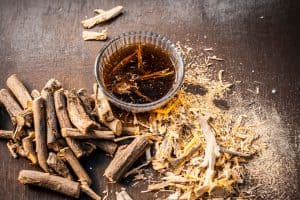
Tummies are important Tummy herbs! A Shutterstock Licensed Image
There are many reasons why our stomachs make noise and feel unsettled. When you have a bad case of the stomach grumbling, you might also be suffering from excessive bloating, farting, irritable bowel, or a hyperactive bowel. You might even have a belly murmur that sounds exactly like “borborygmi!”
These symptoms might coincide with feelings of anxiousness, nausea, fatigue, dizziness, insomnia, and cramps. While it might be temporary, your discomfort could stem from a variety of causes. If you’re asking, “Why is my stomach growling?” or “Why is my stomach always grumpy?” consider these ideas:
- You may have eaten too fast or too much
- Your stomach might not enjoy cold food or ice water (most don’t)
- You may have eaten something that wasn’t cooked properly
- You might be so nervous that your tummy is generating too much acid
- You may have consumed food or water that had bacteria like Salmonella enteritidis or Listeria monocytogenes
- You may have eaten food that had parasites like Giardia
- You might have allergies that resulted in inflammation in your digestive tract
- You may have swallowed overly chlorinated water
- You may have drunk too much alcohol
- The healthy bacteria in your system might be depleted
- You might not be getting enough nutrients in your diet
- Your recent meal may have been too spicy
“When I prayed for success, I forgot to ask for
sound sleep and good digestion.”
— Mason Cooley
When complaining about your gurgling stomach, and the aches and pains throughout your abdomen, it’s important to remain calm and refrain from jumping to conclusions. When searching online for answers, while interesting, the majority of the information you’ll source will not pertain to your specific situation. Even if you chance upon the perfect protocol, one that feels aligned with heart, brain, and each of your chakras, it’s possible you might not have given yourself the correct diagnosis.
Before popping self-prescribed pills and tea-steeping yourself into hysteria with hipster healing regiments, seek the counsel of a professional. In almost all cases, you’ll be safer when you consult with Medical Doctors (MDs), Nurses (RNs), Doctors of Osteopathy (DOs), Chiropractors (DCs), Doctors of Naturopathic Medicine (NDs), and nutritional experts.
While I am not prescribing anything specific in this article, here are some ideas you might consider when researching healing modalities, herbs, and supplements.
Herbs And Foods For Upset Stomachs
A few herbs, supplements, and foods can go a long way when we’re trying to heal our upset stomachs and digestive tracts. While you might feel safe when experimenting with some of these things, it’s best not to try everything at once.
While some of these foods are healing in small amounts, they might be dangerous in larger quantities, and when combined with other items. There’s also a chance you’ll have allergic reactions, so be careful and mindful.
Consider making warm and hot beverages with these herbs and foods:
- Apple Cider Vinegar
- Chamomile
- Fennel
- Turmeric
- Calendula
- Cinnamon
- Ginger
- Mint
- Basil
- Cumin
- Manuka Honey
- Fenugreek
- Marshmallow Root
- Artichoke Leaf Extract
- Warm saltwater
Chinese Antimicrobial And Anti-Inflammatory Herbs
In Chinese medicine, qi (chi) is the life energy that runs through our bodies. This energy is continuously in flux. Traditional Chinese Medicine treatments help to promote, maintain, and heal the flow of the body’s energy. The two opposing sets of attributes within our qi are Yin and Yang. Yin refers to night, dark, cold, feminine, and negative. Yang’s characteristics are day, light, warm, positive, and masculine.
Long before western medicine hit its stride, the Chinese had sourced and tested thousands of healing herbs and remedies. With regard to our bellies and intestines, Chinese Medicine offers profound methodologies for healing inflammation in the gut and extinguishing harmful microbes in the body.
Here is a sampling of some of the more popular Chinese herbs in this category. As with all medicinals, be sure to properly educate yourself, and be judicious with quantities and repetitive usage.
- Huáng Qín (黃芩 Scutellaria baicalensis)
- Huáng Lián (黃連 Coptis chinensis)
- Jīn Yín Hūa (金銀花 Flos Lonicerae)
- Lián Qiào (連翹 Forsythia suspensa)
- Dà Qīn Yè (大青葉 Isatidis Folium)
- Bǎn Lán Gēn (板藍根 Radix Isatidis)
- Zǐ Huā Dì Dīn (紫花地丁 Viola yedoensis)
- Bái Tóu Wēn (白頭翁 Pulsatilla Radix)
- Chuān Xīn Lián (穿心蓮 Andrographis paniculata)
- Yú Xīng Cǎo (魚腥草 Houttuynia cordata)
- Bài Jiàn Cǎo (敗醬草 Patrinia Herba)
- Geng Mi (粳米 Oryzae Semen)
- Shan Zha (山楂 Fructus Crataegi)
- Ji Nei Jin (鸡内金 Endothelium Corneum Gigeriae Galli)
- Mai Ya (麦芽 Fructus Hordei Germinatus)
- Chen Pi (陈皮 Pericarpium Citri Reticulatae)
Ayurvedic Herbs That Can Heal Your Gut
Ayurvedic medicine is over 5000 years old. The word Ayurveda comes from the Sanskrit term, Ayur (life), and Veda (knowledge). Ayurvedic medicine is based upon the Three Doshas: Vata, Pitta, and Kapha. Each of these biological concepts refers to tendencies and attributes found throughout our bodies and minds. Your Dosha might be one of the three or a combination of them.
Each Dosha refers to a specific set of mental processes, health blueprints, and overall physical and emotional tendencies. By balancing and healing our Doshic constructs, we become healthier, happier, and more whole.
To be safe, visit with an Ayurvedic Doctor before consuming any of these herbs.
- Triphala
- Shatapushpa
- Shatavari
- Amalaki
- Haritaki (Terminalia chebula)
- Kapardika Bhasma
- Asafoetida Gum (Hing, F. foetida and F. assa-foetida)
- Yastimadhu (Licorice, Glycyzrrhiza glabra)
- Lavanga (Clove, Syzygium aromaticum)
- Alsarex, Ayucid, Avipatrikar Churna
Over-The-Counter Supplements For Stomach And Bowel Issues
While every stomach and bowel illness has a unique source and required therapy, the following tried-n-true offerings will help heal your belly and improve conditions in your intestines:
- Pepsin
- Alka Seltzer Gold (no aspirin!)
- Probiotics (friendly bacteria)
- Activated Charcoal
- Digestive Enzymes
Parasites, Bacteria, And Food Poisoning
If you’ve ever had a parasite or nasty intestinal bacteria in your gut, you know how debilitating it can be. Western medicine has found it challenging to address these things without prescribing antibiotics. Oftentimes, antibiotics only kill a portion of the little creatures that are nesting in your system. Also, over time, antibiotics can harm our most beneficial bacterias, putting us in even greater jeopardy.
In a balanced regiment, the following supplements can help counter the invasions of harmful parasites and bacteria:
- Monolaurin
- Propolis
- L-Glutamine
- Anise
- Barberry
- Chaparral
- 5-MTHF (Levomefolic acid)
- Slippery Elm
- Rice Bran
- Papain
- DGL (Licorice)
- Berberine
- Black Walnut Seed
- Castor Oil
- Clove Oil
- Peppermint Oil
- Flaxseed Oil
- Goldenseal
- Grapefruit Seed Extract
- Oregano Oil
- Wormwood
Additional Symptoms
Sometimes stomach pain coincides with constipation, vomiting, diarrhea, fever, bloody urine and stool, arm pain, anemia, and discomfort when urinating. If any of these things are prevalent for you, it’s time to see a medical doctor. In situations like these, it’s always best to be cautious.
In all things related to health and life: maintain a positive attitude, be ready to continually release outdated conditions and ideas, and expect the Universe to shower you with blessings. Finally, remember that thousands of miracles happen every day. Your miracle could be next.




